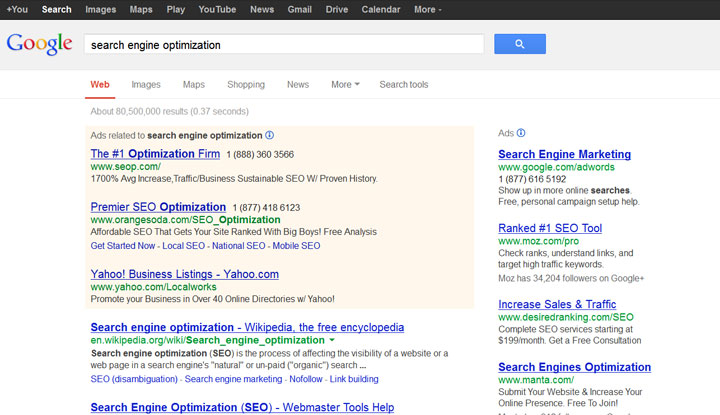Some of the best long term business growth you’ll ever get for your small business will come from refining your startup’s SEO (search engine optimization) strategy. While advertising, marketing or any other kind of paid promotions have their rewards, they have to be constantly kept up … which costs money.
SEO, on the other hand, is mostly cost free as long as you take care of it yourself. Although it’s going to cost you plenty of time, it won’t cost you money.
The Three Steps to Better SEO
A well-organized and successful search engine optimization campaign takes step-by-step planning, systematic implementation and long term dedication. If you aim for the right kind of optimization by following these steps, you are guaranteed to at least notice some difference in your search engine rankings after as little as a few weeks.
1. Research Keywords
Assuming you’ve already established the niche for your small business. Having your niche worked out makes keyword hunting much easier since you already have an idea of who your target audience is.
First, research your keywords; you need to know how many searches there are for these words and the competition you’re dealing with for these words. You can use free services to help with this step. If you want something a lot more robust, you can opt into paid services that will give you access to even more word research options.
You absolutely need to do all this keyword research because these words will have to be peppered throughout your content for later optimization steps.
2. Choose an SEO Friendly Website Design
The type of code you use, its organization and what it contains are important features of long-term SEO. Now, as a basic principle of optimization friendly design, you need to make sure you build a site that is readable to the search engine indexing bots that crawl the web.
This means your site should avoid using too much flash or JavaScript, especially for the demonstration of important content. The search bots can’t read Flash, Java (for the most part) or images themselves. Be particularly careful not to use Flash as your site page navigation interface.
Moreover, your site should be built in accordance with organizations like the W3C (World Wide Web Consortium). Aside from being up-to-date, your code should also be neat, well-structured and free of messy snippets of garbage.
Once you’ve built a successful website, don’t forget to focus on the little but very important details of on-page optimization. These things include making sure that there are text-based HTML attributes to all images, videos and Flash elements on your site.
Now, while you could pay a programmer to make sure the above basic design standards hold true, your most efficient option is to simply use a good content management system (CMS) platform from which you can build your site’s appearance.
CMS platforms are downloadable website packages whose coding is already done; all you need to do is modify their basic layout, page quantities, appearances (skins) and add a few one click downloadable plugins to provide additional site features. All content managing systems give you the benefit of already being expertly designed with the latest, cleanest, most SEO friendly code you’ll find on the internet.
3. Create Quality Content and Build Links
So, you’ve researched your niche keywords, you’ve created a wonderfully optimized website layout and you’ve got pages of SEO friendly URLs to fill. This means that you’re ready for the most important part of long term, high quality SEO: content.
And by content, we mean quality content. Update your site regularly with content that is informative, useful and relevant to your target audience. You want to create content that engages site visitors, making them likely to not only visit your website themselves but to also share it with people they know who have the same interests.
This, applied consistently, will bring you a reputation for expertise and trustworthiness that will attract the attention of not only more readers but also other sites with interests that are related to your own. In turn, your site visitors will probably share your pages through their social media accounts while other site owners will link to your content on their own from their own high quality sites.
These two trends are your absolute best sources for organic link building, making you look naturally popular in the eyes of Google.
Focusing on your company’s SEO strategy is an absolutely integral aspect of growing your small business. Without putting the necessary time and energy into improving your SEO, your startup faces an unnecessarily tiring road to success.
Stephan Jukic has written for the marketing industry for many years and has developed a wealth of knowledge working within the industry. When he’s not writing, you can find him consulting SEO companies and working with Digital Third Coast in Chicago.
© YFS Magazine. All Rights Reserved. Copying prohibited. All material is protected by U.S. and international copyright laws. Unauthorized reproduction or distribution of this material is prohibited. Sharing of this material under Attribution-NonCommercial-NoDerivatives 4.0 International terms, listed here, is permitted.













